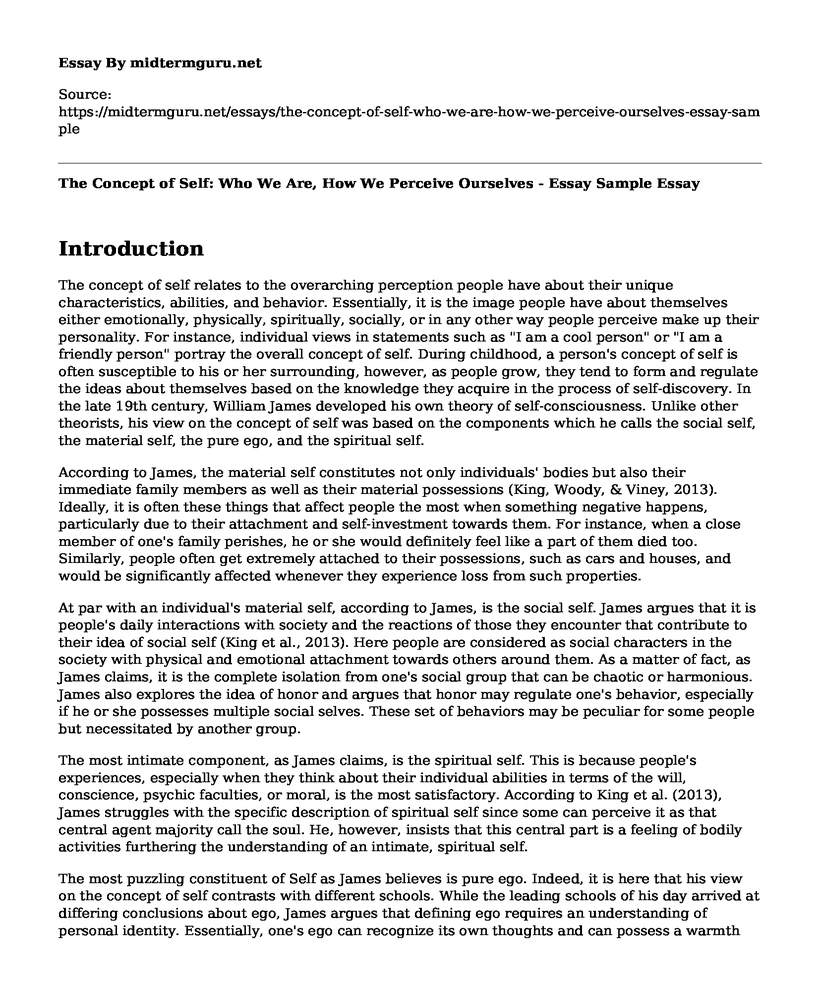Introduction
The concept of self relates to the overarching perception people have about their unique characteristics, abilities, and behavior. Essentially, it is the image people have about themselves either emotionally, physically, spiritually, socially, or in any other way people perceive make up their personality. For instance, individual views in statements such as "I am a cool person" or "I am a friendly person" portray the overall concept of self. During childhood, a person's concept of self is often susceptible to his or her surrounding, however, as people grow, they tend to form and regulate the ideas about themselves based on the knowledge they acquire in the process of self-discovery. In the late 19th century, William James developed his own theory of self-consciousness. Unlike other theorists, his view on the concept of self was based on the components which he calls the social self, the material self, the pure ego, and the spiritual self.
According to James, the material self constitutes not only individuals' bodies but also their immediate family members as well as their material possessions (King, Woody, & Viney, 2013). Ideally, it is often these things that affect people the most when something negative happens, particularly due to their attachment and self-investment towards them. For instance, when a close member of one's family perishes, he or she would definitely feel like a part of them died too. Similarly, people often get extremely attached to their possessions, such as cars and houses, and would be significantly affected whenever they experience loss from such properties.
At par with an individual's material self, according to James, is the social self. James argues that it is people's daily interactions with society and the reactions of those they encounter that contribute to their idea of social self (King et al., 2013). Here people are considered as social characters in the society with physical and emotional attachment towards others around them. As a matter of fact, as James claims, it is the complete isolation from one's social group that can be chaotic or harmonious. James also explores the idea of honor and argues that honor may regulate one's behavior, especially if he or she possesses multiple social selves. These set of behaviors may be peculiar for some people but necessitated by another group.
The most intimate component, as James claims, is the spiritual self. This is because people's experiences, especially when they think about their individual abilities in terms of the will, conscience, psychic faculties, or moral, is the most satisfactory. According to King et al. (2013), James struggles with the specific description of spiritual self since some can perceive it as that central agent majority call the soul. He, however, insists that this central part is a feeling of bodily activities furthering the understanding of an intimate, spiritual self.
The most puzzling constituent of Self as James believes is pure ego. Indeed, it is here that his view on the concept of self contrasts with different schools. While the leading schools of his day arrived at differing conclusions about ego, James argues that defining ego requires an understanding of personal identity. Essentially, one's ego can recognize its own thoughts and can possess a warmth uniquely based on that thought. James concludes that this feeling of warmness can extensively inspire the ideas and thoughts passing through an individual's mind.
Cocnlusion
In conclusion, James' view on the concept of self is based on social self, the material self, the pure ego, and the spiritual self. He argues that the material self constitutes an individual's body, immediate family members, and his or her material possessions. He also argues that it is people's daily interactions with the society and the reactions of those they encounter that contribute to their idea of the social self. The spiritual self is an intimate component of Self involving bodily activities. Finally, James suggests that the ego has its own thoughts and possesses warmth absent in the thoughts possessed by a separate ego.
Reference
King, D. B., Woody, W. D., & Viney, W. (2013). History of Psychology: Ideas and Context. (5th Ed.). Routledge.
Cite this page
The Concept of Self: Who We Are, How We Perceive Ourselves - Essay Sample. (2023, Jan 27). Retrieved from https://midtermguru.com/essays/the-concept-of-self-who-we-are-how-we-perceive-ourselves-essay-sample
If you are the original author of this essay and no longer wish to have it published on the midtermguru.com website, please click below to request its removal:
- Essay Sample on Behavior Change Strategies
- Social Group Analysis Project
- Personal Skills Audit: Identifying Strengths & Needs for Career Growth - Essay Sample
- Creating an Effective Communication Plan: Analyzing Old Practices & Strategies - Research Paper
- Reviewing Forms for Compliance: Frequency & Preparedness - Essay Sample
- Newborns: Born With Social Skills to Connect and Thrive - Essay Sample
- Who Killed Reconstruction - Essay Sample







